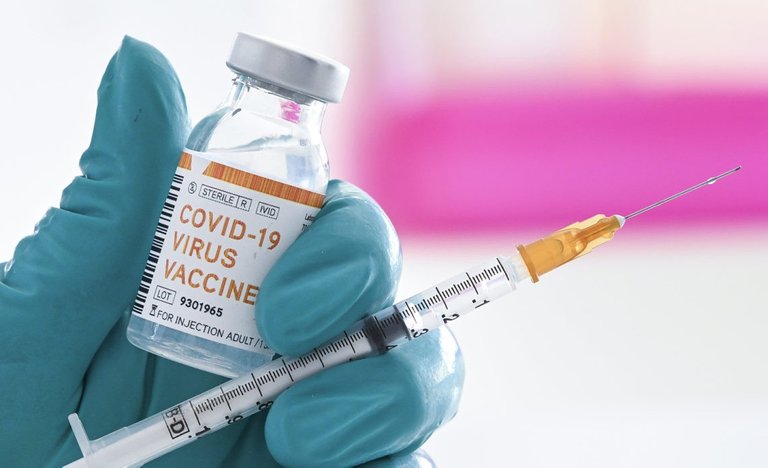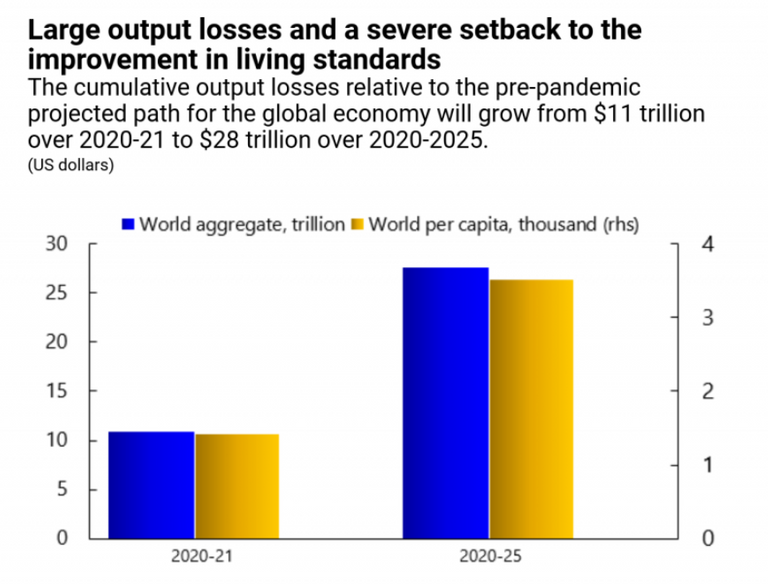Did you know that the IMF advocates a corona tax? That and other striking facts about COVID-19

Some striking facts, figures or quotes from all over the world that received little or no attention in the mainstream media, but are certainly worth mentioning in order to understand today's chaotic world.
Corona tax
The coronavirus has sold the economy an unprecedented blow. In the second quarter, there were almost half a billion fewer people working worldwide than before. The total cost over the period 2020-2025 is estimated by the IMF at 28,000 billion dollars.
In order to avoid a total collapse of the economy, governments have pumped a massive amount of money into the economy. To date, approximately 11,700 billion dollars, accounting for 13 percent of Gross World Product.
Sources: IMF, World Economic Outlook
The big question then is who will pay this outrageous bill. During the financial crisis of 2008, in line with neoliberal policies, it was presented to the working population by means of savings plans and wage losses. But did you know that the International Monetary Fund, the driving force behind the savings policy of the past forty years, has now suddenly turned 180 degrees? According to the IMF, this crisis will cause "lasting damage" to the economy and will be a "major setback to the standard of living" of people around the world. Therefore, according to the fund, taxes should increase for the rich and the companies. What are we waiting for?
Most economies will experience lasting damage to supply potential, reflecting scars from the deep recession this year and the need for structural change. The persistent output losses imply a major setback to living standards relative to what was expected before the pandemic.
Although adopting new revenue measures during the crisis will be difficult, governments may need to consider raising progressive taxes on more affluent individuals and those relatively less affected by the crisis (including increasing tax rates on higher income brackets, high-end property, capital gains, and wealth) as well as changes to corporate taxation that ensure firms pay taxes commensurate with profitability.
Source: IMF, World Economic Outlook 2020. A Long and Difficult Ascent
Profit and vaccines
The fact that a vaccine will be available soon is an excellent thing. But, with Pfizer and Moderna exclusively in the spotlight, it seems as if our salvation depended on multinationals and private capital. The reverse is true.
Since the outbreaks of two other coronaviruses, SARS in 2002 and MERS in 2012, scientists have warned us repeatedly about a new pandemic. In 2016, the World Health Organization placed coronaviruses in the top eight viral threats for which more research was needed. However, pharmaceutical companies were not interested because there were no profit expectations at that time. No wonder we were totally unprepared for the most predicted pandemic ever. According to Chomsky, market interests once again played a frightening role to the detriment of mankind.

Did you know that between 2009 and 2018 the pharmaceutical giants spent more money on paying dividends and buying back their own shares than on research and development? Did you also know that governments and supranational organizations assumed a large part of the costs for the research and development of vaccines and drugs for Covid-19? It is 6 billion dollars. So a lot of money from the governments, but just guess who will walk away with the mega profits.
Vaccinate, easier said than done
It is the first time in history that the entire world population has to be vaccinated at once. And as they say, it is not the vaccine but the vaccination that saves people's lives. Vaccinating 7.8 billion people will indeed be a gigantic feat of strength. Did you know that 850 million syringes will be needed in the US alone? In May, the country had barely 15 million in stock. For less wealthy countries, this problem will become even more acute.
Transport will be a huge challenge. Did you know that in order to distribute a single dose to all the inhabitants of the planet, 8,000 flights are needed with a Boeing 747 cargo plane? The vaccines from Pfizer and Moderna require two vaccinations.
And then there is the required cooling. Pfizer's vaccine must be stored at less than -70°C. The production of such specialized refrigeration units is in full swing, but it will be several months before sufficient installations will be available for all countries. Did you know that the U.S. doesn't have these installations available and that it has to order them from China, the country against which it started a trade war? In this sector, China has the lowest prices and also the largest capacity.
For most countries in the South, it is impossible or prohibitively expensive to store and transport vaccines at freezing temperatures. Fortunately, the Chinese have designed a vaccine that can be kept at normal fridge temperatures (2°C - 8°C) for three years.

There are currently 11 vaccine candidates worldwide in phase three, which is the final phase before official approval. Did you know that 4 of these candidates are of Chinese origin? Did you also know that China has donated $2 billion to Covax, a UN sponsored global group procurement with the goal of vaccinating 20 percent of the population, especially in the countries of the South, by the end of next year? Chinese support is four times that of the European Union.

Terrible virus
I know... Hopefully the worst is behind us.
Nice article! Very informative. Keep up the good work!
Thanks!